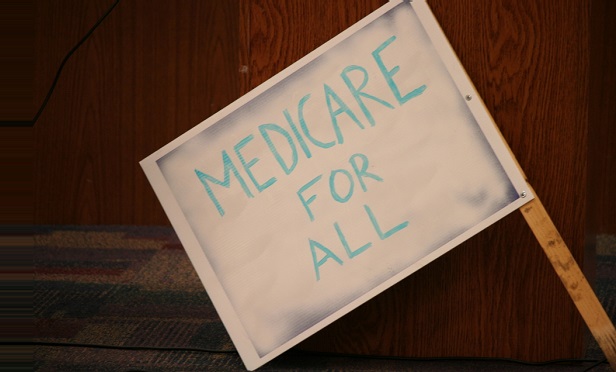 Democratic presidential hopefuls have been nearly unanimous in embracing some version of Medicare for All, and the emergence of the new lobbying group is a sign that the industry is taking the idea very seriously. (Photo: Shutterstock)
Democratic presidential hopefuls have been nearly unanimous in embracing some version of Medicare for All, and the emergence of the new lobbying group is a sign that the industry is taking the idea very seriously. (Photo: Shutterstock)
Many health care industry groups are lining up to oppose the concept of Medicare for All, with the nation's largest health care lobbying groups solidly opposing the concept after enduring the roller coaster ride that accompanied the Affordable Care Act (ACA).
Insurance, physician, hospital and pharmaceutical groups have joined together to form the Partnership for America's Health Care Future (PAHCF), which said its mission is “…to improve what's working in health care and fix what's not. We support building on the strength of employer-provided health coverage and preserving Medicare, Medicaid, and other programs,” the group said on its website.
Related: Next up for GOP: Shooting down Medicare for All
What it doesn't support is Medicare for All, a concept to expand Medicare's single-payer model to cover more, or all, Americans. Democratic presidential hopefuls have been nearly unanimous in embracing some version of Medicare for All, and the emergence of the new lobbying group is a sign that the industry is taking the idea very seriously indeed.
“The Democrats' proposals could radically change the way health care providers do business and could drastically shrink the role and the revenues of insurers, depending on how a single-payer system is devised,” Robert Pear of the New York Times wrote in a Feb. 23 story. “Doctors, hospitals, drug companies, and insurers are intent on strangling Medicare for all before it advances from an aspirational slogan to a legislative agenda item.”
PAHCF was launched in June of last year, but has geared up recently to create a much more public stance in opposition to the Medicare for all idea, which picked up steam with the election of Democratic House majority. The group includes heavy-hitting lobbying groups such as America's Health Insurance Plans, PhRMA, the American Medical Association, the American Hospital Association, and other large insurance and provider groups.
The group's website emphasizes improving medical care by strengthening both employer-based insurance and government programs such Medicare and Medicaid. But the headlines on its press page reveal a more pointed approach: “Medicare for all means Less Patient Choice and Higher Taxes;” “A One-Size-Fits-All Approach Will Not Work;” “Just 13 percent [in a public poll] Favor Single-Payer Health Care.”
“We can all agree that every American deserves access to affordable health coverage and high-quality care, but this proposal—whether you call it Medicare for All, Medicare buy-in, single-payer or a public option—moves us toward a one-size-fits-all health care system that is wrong for America,” said Lauren Crawford Shaver, PAHCF's Executive Director.
The industry might be understandably wary of a big, disruptive change to health care after the ups and downs of the ACA's passage and implementation. Following the heavy lifting by America's employers, insurers, providers, and other stakeholders to adapt to the most sweeping health care reform since the 60s, stakeholders had to watch as the Trump Administration then tried to repeal the law. And although that effort failed, tinkering with the ACA continues. The appetite to upend a major part of the country's economy is very small among major stakeholders.
Nevertheless, ongoing consumer dissatisfaction over cost and access to health care will likely continue to drive political pressure for change. Some polls last year put support for the Medicare for all concept at 70 percent among Americans. However, a recent poll by the Kaiser Family Foundation found support varied depending on how the term was defined. In the poll, 56 percent of Americans said they supported Medicare for all, but if told the program would create delays to care or higher taxes, support fell to 26 percent and 37 percent, respectively.
The battle to define Medicare for all will continue, and the members of PAHCF will use their considerable resources to press for a cautious approach to reform. One of those members, the National Retail Federation, originally opposed the ACA, but has tried to make it work, the Times' story noted. E. Neil Trautwein, the vice president for health care policy with NRF, said in the story that preserving the stability of employer-based insurance is his group's goal. “We are trying to understand what will be coming at us,” Trautwein said. “Proposals on the left and the right, in Congress and on the campaign trail, could blow up the employer-based health care system that has worked pretty well for more than 60 years.”
Read more:
- Poll shows growing support for Medicare for All
- Medicare, Medicaid better at holding down costs than private insurance
- NYC's healthcare-for-all collides with hospitals bleeding cash
© 2025 ALM Global, LLC, All Rights Reserved. Request academic re-use from www.copyright.com. All other uses, submit a request to [email protected]. For more information visit Asset & Logo Licensing.







